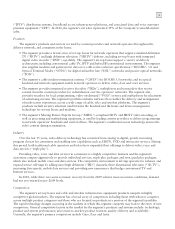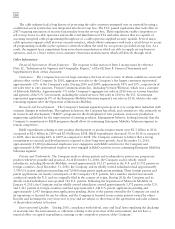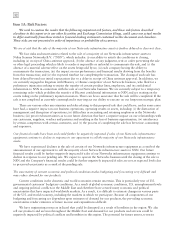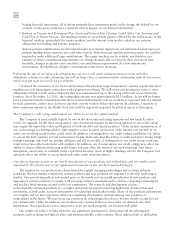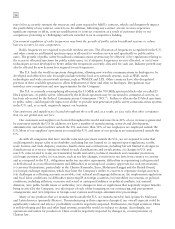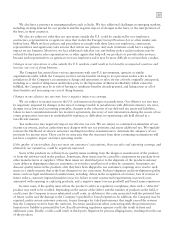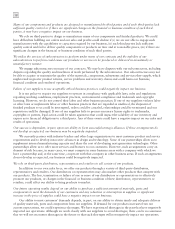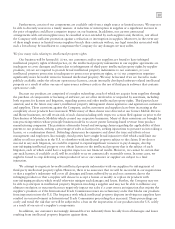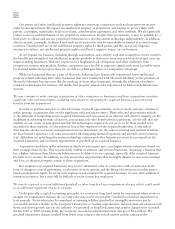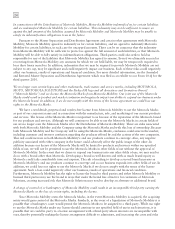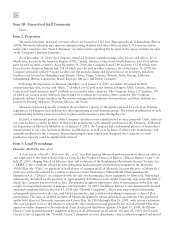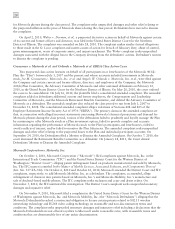Motorola 2010 Annual Report Download - page 27
Download and view the complete annual report
Please find page 27 of the 2010 Motorola annual report below. You can navigate through the pages in the report by either clicking on the pages listed below, or by using the keyword search tool below to find specific information within the annual report.
19
Furthermore, certain of our components are available only from a single source or limited sources. We may not
be able to diversify sources in a timely manner. A reduction or interruption in supplies or a significant increase in
the price of supplies could have a negative impact on our business. In addition, our current contractual
arrangements with certain suppliers may be cancelled or not extended by such suppliers and, therefore, not afford
the Company with sufficient protection against a reduction or interruption in supplies. Moreover, in the event any
of these single source or limited source suppliers breach their contracts with us, our legal remedies associated with
such a breach may be insufficient to compensate the Company for any damages we may suffer.
We face many risks relating to intellectual property rights.
Our business will be harmed if: (i) we, our customers and/or our suppliers are found to have infringed
intellectual property rights of third parties, (ii) the intellectual property indemnities in our supplier agreements are
inadequate to cover damages and losses due to infringement of third-party intellectual property rights by supplier
products, (iii) we are required to provide broad intellectual property indemnities to our customers, (iv) our
intellectual property protection is inadequate to protect our proprietary rights, or (v) our competitors negotiate
significantly more favorable terms for licensed intellectual property. We may be harmed if we are forced to make
publicly available, under the relevant open-source licenses, certain internally developed software-related intellectual
property as a result of either our use of open-source software code or the use of third-party software that contains
open-source code.
Because our products are comprised of complex technology, much of which we acquire from suppliers through
the purchase of components or licensing of software, we are often involved in or impacted by assertions, including
both requests for licenses and litigation, regarding patent and other intellectual property rights. Third parties have
asserted, and in the future may assert, intellectual property infringement claims against us and against our customers
and suppliers. These assertions against the Company, and its customers and suppliers have been increasing as the
complexity of our products have increased. While many of these claims were directed at our former Mobile Devices
and Home businesses, we still retain risk of such claims including with respect to actions filed against us prior to the
Distribution of Motorola Mobility which crossed our respective businesses. Many of these assertions are brought by
non-practicing entities whose principle business model is to secure patent licensing-based revenue from product
manufacturing companies. The patentees often make broad and sweeping claims regarding the applicability of their
patents to our products, seeking a percentage of sales as licenses fees, seeking injunctions to pressure us into taking a
license, or a combination thereof. Defending claims may be expensive and divert the time and efforts of our
management and employees. Increasingly, third parties have sought broad injunctive relief which could limit our
ability to sell our products in the U.S. or elsewhere with intellectual property subject to the claims. If we do not
succeed in any such litigation, we could be required to expend significant resources to pay damages, develop
non-infringing intellectual property or to obtain licenses to the intellectual property that is the subject of such
litigation, each of which could have a negative impact on our financial results. However, we cannot be certain that
any such licenses, if available at all, will be available to us on commercially reasonable terms. In some cases, we
might be forced to stop delivering certain products if we or our customer or supplier are subject to a final
injunction.
We attempt to negotiate favorable intellectual property indemnities with our suppliers for infringement of
third-party intellectual property rights. However, there is no assurance that we will be successful in our negotiations
or that a supplier’s indemnity will cover all damages and losses suffered by us and our customers due to the
infringing products or that a supplier will choose to accept a license or modify or replace its products with
non-infringing products which would otherwise mitigate such damages and losses. Further, the Company may not
be able to participate in intellectual property litigation involving a supplier and may not be able to influence any
ultimate resolution or outcome that may negatively impact our sales if a court enters an injunction that enjoins the
supplier’s products or if the International Trade Commission issues an exclusionary order that blocks our products
from importation into the U.S. The frequency with which intellectual property disputes involving our suppliers have
resulted in our involvement in International Trade Commission proceedings has increased. These proceedings are
costly and entail the risk that we will be subjected to a ban on the importation of our products into the U.S. solely
as a result of our use of a supplier’s components.
In addition, our customers increasingly demand that we indemnify them broadly from all damages and losses
resulting from intellectual property litigation against them.


